|
|
|
Sort Order |
|
|
|
Items / Page
|
|
|
|
|
|
|
| Srl | Item |
| 1 |
ID:
145105
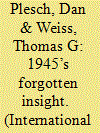

|
|
|
|
|
| Summary/Abstract |
The 70th anniversary of the signing and entry into force of the UN Charter provided an occasion to explore the historical underpinnings of contemporary global governance. This article redresses the neglect of the United Nations as a multilateral structure before the conference that drafted the Charter in 1945. It rehabilitates an underappreciated aspect of the period that began on January 1, 1942, with the “Declaration by United Nations,” namely, the combination of multilateral strategies for military and human security to achieve victory in war and peace. The wide substantive and geographic resonance suggests the extent to which the pressures of the second war to end all wars helped states to overcome their disinclination to collaborate. Today’s fashionable calls for “good enough” global governance abandon the strategy of constructing robust intergovernmental organizations; they are not good enough, especially, because our forebears did much better. Many insights and operational approaches from 1942 to 1945 remain valid for addressing twenty-first-century global challenges.
|
|
|
|
|
|
|
|
|
|
|
|
|
|
|
|
| 2 |
ID:
006753
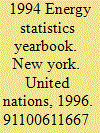

|
|
|
|
|
| Publication |
New York, United Nations, 1996.
|
| Description |
iv, 490p., figures and tables
|
| Standard Number |
91100611667
|
|
|
|
|
|
|
|
|
|
|
|
Copies: C:1/I:0,R:0,Q:0
Circulation
| Accession# | Call# | Current Location | Status | Policy | Location |
| 038574 | R 333.7905/UNI 038574 | Main | On Shelf | General | |
|
|
|
|
| 3 |
ID:
076739
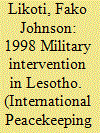

|
|
|
|
|
| Publication |
2007.
|
| Summary/Abstract |
The 1998 military intervention in Lesotho by South Africa and Botswana was shrouded in controversy. While South African officials claimed that the intervention was a Southern African Development Community (SADC) humanitarian peacekeeping mission to rescue Lesotho from a coup, the intervention appears to have been inconsistent with the UN Charter and with the SADC Treaty. Indeed, SADC had no role in legitimating this intervention because proposals relevant to coups had not been ratified by the SADC Summit. It would appear that the motivation for this intervention, at least on the part of South Africa, was to secure strategic resources, mainly water. National interest explains the intervention, rather than the rescue of a captive state as South Africa claimed.
|
|
|
|
|
|
|
|
|
|
|
|
|
|
|
|
| 4 |
ID:
112621
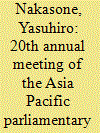

|
|
|
| 5 |
ID:
113379
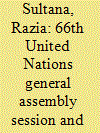

|
|
|
|
|
| Publication |
2011.
|
| Summary/Abstract |
Since its inception in 1945, the United Nations (UN) has been playing a pivotal role in restoring peace and maintaining security by taking several measures. One of the regular UN activities is to arrange the United Nations General Assembly (UNGA) intending to gather all the Heads of States and Governments to discuss multiple challenging issues faced by the member states nationally and globally. As the continuation of the UN action, the 66th UNGA held in September 2011 came up with several pertinent issues like climate change, global recession, food crisis, nuclear safety and terrorism. Bangladesh's Prime Minister Sheikh Hasina also attended the 66th UNGA and proposed a six-point multi-dimensional peace model addressing a number of national and global vulnerabilities including poverty and hunger, inequality, climate change and terrorism. It is in this context that the paper tries to focus on the issues discussed in the 66th UNGA and give an assessment regarding the steps taken by the assembly considering its existing limitations. Concurrently, the paper takes an attempt to analyse the role of Bangladesh as a developing country in the 66th UNGA session. The paper argues that through arranging UNGA for more than 60 years, the UN still tries to provide a unique venue for the member countries to discuss complex national and global issues and solve international disputes. More importantly, it is a common platform for small countries like Bangladesh to raise their voice, place their demands and to work together against the common global challenges.
|
|
|
|
|
|
|
|
|
|
|
|
|
|
|
|
| 6 |
ID:
171651
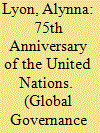

|
|
|
|
|
| Summary/Abstract |
We are pleased to introduce this special issue of Global Governance on the occasion of the 75th anniversary of the founding of the United Nations. This milestone offers an opportunity for reflection, deep assessment, and thoughtful prescriptions for the organization to address the global politics of the twenty-first century.
|
|
|
|
|
|
|
|
|
|
|
|
|
|
|
|
| 7 |
ID:
055368
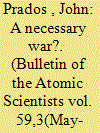

|
|
|
| 8 |
ID:
091282
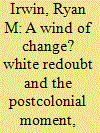

|
|
|
|
|
| Publication |
2009.
|
| Summary/Abstract |
In July 1963, U.S. Secretary of State Dean Rusk held a private meeting with Dr. Willem Naude, the ambassador from South Africa. "A rough time [is] ahead," Rusk explained as the representative sat down in his office. "We are under enormous pressure but do not intend to give in." Several members of the so-called African bloc at the United Nations had successfully protested the practice of apartheid-South Africa's system of institutionalized racial discrimination-in the Security Council that year, and pressure was rapidly mounting in the General Assembly for mandatory economic sanctions against South Africa. The ambassador looked across Rusk's desk and noted that it was "ironical" that ten years earlier they had been allies in the Cold War, and now his country was being isolated in its struggle against a "common enemy." He went on to assert, "The United States [is] to a large degree responsible for releasing these revolutionary forces in the world. The goal of a great power should be to play down tensions and try to get people to talk together, but the United States without even opening its mouth [has] released dangerous forces in the world." Rusk paused for a moment before responding, "[I wonder] if these forces [are] not deeply rooted in the nature of man. [I wonder] if this discourse has not been going on for 2,000 years. Did not man, like most animals, not like to be pushed around too much?"
|
|
|
|
|
|
|
|
|
|
|
|
|
|
|
|
| 9 |
ID:
137374
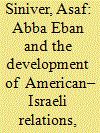

|
|
|
|
|
| Summary/Abstract |
Abba Eban, Israel’s ambassador in Washington and representative at the United Nations from 1950 to 1959, had a central role in the transformation of American–Israeli relations during a period of frequent discord over key strategic issues. This analysis examines the influence of one prominent actor upon bilateral ties that would eventually become the American–Israeli “special relationship.” Eban’s oratory talent, linguistic skills, and effective style of diplomacy augmented both Israel’s image in the view of the American public and relations with official Washington. The article explores several critical elements of these relations during the 1950s, re-examining both Eban’s involvement in events such as Israel’s approach toward the problem of borders, its policy of military retaliation, and the response to severe American pressure following the 1956 Sinai campaign. Whilst not attributing the development of close relations between the two Powers solely to the works of a single individual, evidence suggests that Eban was the right man in the right place and time to provide the necessary foundations for the elevation of American–Israeli relations to “special” in the following decade.
|
|
|
|
|
|
|
|
|
|
|
|
|
|
|
|
| 10 |
ID:
093624
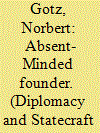

|
|
|
|
|
| Publication |
2009.
|
| Summary/Abstract |
This article examines Norwegian policy vis--vis the United Nations (UN) through the end of 1945. From here it will become clear that framing foreign policy orientations of the 1940s along conventional lines exaggerates the commitment of Norwegian politicians to two grand ideas. The novel idea of Atlantic alignment, developed by Norwegian circles in London exile, was more ambiguous than generally acknowledged and left room for universal extension. By contrast, the alleged turn in the mid-1940s toward support of the UN was in the form of lip-service as opposed to action that would have engaged actors from Norway. The government outsourced policy-making on the issue to a small circle of experts and made no attempt to exert leadership in regard to UN matters. Norway's indifference toward the UN in the 1940s stands in marked contrast to the country's later reputation as a faithful supporter of the world organization.
|
|
|
|
|
|
|
|
|
|
|
|
|
|
|
|
| 11 |
ID:
058835
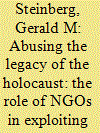

|
|
|
| 12 |
ID:
153268
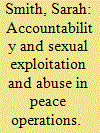

|
|
|
|
|
| Summary/Abstract |
In March 2016, the United Nations Security Council adopted its first resolution devoted entirely to the prevention of peacekeeper sexual exploitation and abuse (SEA) in peace operations. This article examines resolution 2272 by drawing on past practice and the perspective of those at mission sites—namely, Timor-Leste—arguing that the mechanism it establishes—repatriation—is limited in its capacity to prevent SEA and provide justice outcomes. The article demonstrates the pervasive sense of powerlessness regarding SEA and the impunity of those who do perpetrate SEA. The article further situates the issue of SEA by peacekeepers in the post-conflict (gendered) context in which it occurs, arguing that the resolution does not challenge the underlying norms and gendered relations of power that underpin peace operations. Instead, the resolution frames SEA as chiefly an issue of embarrassment for the United Nations and makes scant mention of the populations that peace operations are mandated to protect, as well as the perspectives and needs of victims of SEA.
|
|
|
|
|
|
|
|
|
|
|
|
|
|
|
|
| 13 |
ID:
068922
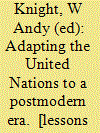

|
|
|
|
|
| Publication |
Hampshire, Palgrave Macmillan, 2001.
|
| Description |
xxiv, 272p.
|
| Series |
Global issues series
|
| Standard Number |
0333801504
|
|
|
|
|
|
|
|
|
|
|
|
Copies: C:1/I:0,R:0,Q:0
Circulation
| Accession# | Call# | Current Location | Status | Policy | Location |
| 044350 | 341.23/KNI 044350 | Main | On Shelf | General | |
|
|
|
|
| 14 |
ID:
080306
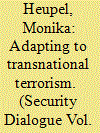

|
|
|
|
|
| Publication |
2007.
|
| Summary/Abstract |
During the 1990s, and particularly since 9/11, state-sponsored terrorism gradually declined, while transnational terrorism, which largely operates without direct state support and features cross-border network structures and a greater propensity to mass-casualty attacks, has gained in importance. Setting out from this observation, the purpose of this article is to examine whether the UN Security Council (SC) has adapted to transnational terrorism and, if so, how. Providing a systematic and theory-guided comparison of the SC's approach to these different types of terrorism, the article shows that, contrary to common considerations, the SC did adapt to transnational terrorism. The SC applied sanctions against terrorists and committed every state to instituting far-reaching generic counter-terrorism measures. Moreover, in an unprecedented way, it made use of managerial compliance strategies to foster implementation. In this way, the SC adapted to transnational terrorism by demanding more from states and intervening deeper into their domestic realm, while at the same time offering more support with respect to implementation. While such an approach is unlikely to become common SC practice in the short term, it is nevertheless symptomatic of a broader trend in the evolution of governance patterns in the post-national constellation today
|
|
|
|
|
|
|
|
|
|
|
|
|
|
|
|
| 15 |
ID:
127066
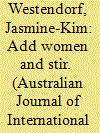

|
|
|
|
|
| Publication |
2013.
|
| Summary/Abstract |
With the changing nature of warfare and the increasing awareness of the specific gender dimensions of war and peace, the international legal framework has been expanded to address the particular challenges faced by women in conflict and post-conflict contexts. This process culminated in 2000 with the first United Nations document to explicitly address the role and needs of women in peace processes: United Nations Security Council Resolution (UNSCR) 1325 on women, peace and security. Thirteen years on, this article assesses the extent to which Australia's stated commitment to women, peace and security principles at the level of the international norm has translated into meaningful action on the ground in the Regional Assistance Mission to Solomon Islands (RAMSI). The analysis shows that despite it being an ideal context for a mission informed by UNSCR 1325, and Australia being strongly committed to the resolution's principles and implementation, the mission did not unfold in a manner that fulfilled Australia's obligations under UNSCR 1325. The RAMSI case highlights the difficulty in getting new security issues afforded adequate attention in the traditional security sphere, suggesting that while an overarching policy framework would be beneficial, it may not address all the challenges inherent in implementing resolutions such as UNSCR 1325
|
|
|
|
|
|
|
|
|
|
|
|
|
|
|
|
| 16 |
ID:
185064
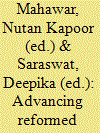

|
|
|
|
|
| Publication |
DelhI, Macmillan Education India Pvt Ltd, 2022.
|
| Description |
viii, 284p.hbk
|
| Standard Number |
9789354551765
|
|
|
|
|
|
|
|
|
|
|
|
Copies: C:1/I:0,R:0,Q:0
Circulation
| Accession# | Call# | Current Location | Status | Policy | Location |
| 060171 | 327.101/MAH 060171 | Main | On Shelf | General | |
|
|
|
|
| 17 |
ID:
104786
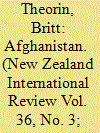

|
|
|
| 18 |
ID:
130198
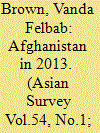

|
|
|
|
|
| Publication |
2014.
|
| Summary/Abstract |
Uncertainties about the 2014 security, political, and economic transitions pervaded Afghanistan in 2013. The failure in 2013 to sign a U.S.-Afghan security agreement permitting the presence of U.S. troops after 2014 deepens those anxieties. As ISAF forces continued to withdraw from Afghanistan, Afghan security forces now have primary responsibility for Afghanistan's security but still face critical challenges and an undefeated Taliban. Peace negotiations have been stalled. Politics were dominated by the upcoming 2014 presidential election that can renew the legitimacy of the existing political system or throw the country into turmoil.
|
|
|
|
|
|
|
|
|
|
|
|
|
|
|
|
| 19 |
ID:
137191
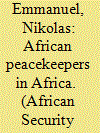

|
|
|
|
|
| Summary/Abstract |
African states today are strongly encouraged by the United States (US) and other members of the international community to play a more central role in confronting crises on the continent. Indeed, in recent years African armed forces have increasingly served as the backbone supporting various peacekeeping operations in the region. It is important to add that the international community has frequently tried to facilitate the deployment of African armed forces with aid and training. From this reality, the following study goes beyond the current literature by focusing on the international factors behind African participation in United Nations (UN) peacekeeping operations in Africa. In doing so, this research focuses on US military aid and foreign troop training from 2002 to 2012, and its impact on African deployments into UN peacekeeping missions in Africa. As can be expected, such third-party help appears to be an important motivating factor encouraging African troop deployment into crises on the continent.
|
|
|
|
|
|
|
|
|
|
|
|
|
|
|
|
| 20 |
ID:
122306
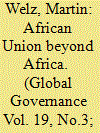

|
|
|
|
|
| Publication |
2013.
|
| Summary/Abstract |
This article explores the motives and means of the African Union and its member states for engaging in governance beyond Africa, and shows the leeway and limits the African organization faces in this regard. Two questions are at the center of the article. Is the AU successful in influencing governance beyond Africa? And what explains its success or failure? Three case studies form the article's empirical background: a study of the 2005 discussion about a reform of the UN Security Council; a study of the negotiations during the Climate Change Conference in Copenhagen in 2009; and, finally, a study of the attempt to defer the International Criminal Court's arrest warrant against Sudanese president Omar al-Bashir in 2009. The article argues that the AU can influence governance beyond Africa only if it is united, adopts realistic positions, and gains the support of more influential global players.
|
|
|
|
|
|
|
|
|
|
|
|
|
|
|
|
|
|
|
|
|